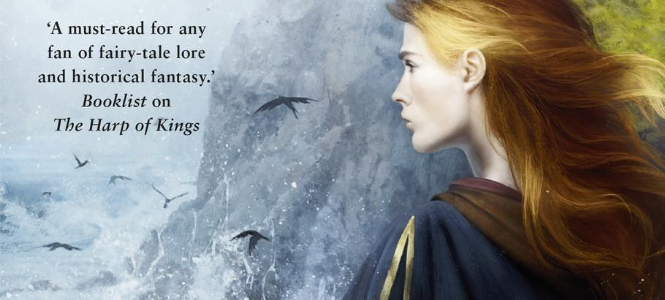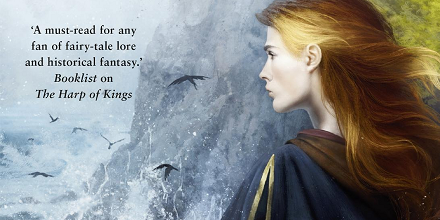Juliet Marillier was born in Dunedin, New Zealand and grew up surrounded by Celtic music and stories. Her own Celtic-Gaelic roots inspired her to write her first series, the Sevenwaters Trilogy. Juliet was educated at the University of Otago, where she majored in music and languages, graduating BA and a B Mus (Hons). Her lifelong interest in history, folklore and mythology has had a major influence on her writing. She is the author of twenty award-winning historical fantasy novels for adults and young adults, as well as a book of short fiction, and her latest novel is A Dance with Fate, the second in her Warrior Bards series.
Today, Juliet is on the blog to answer a couple of our questions about her new book, which is out today. Read on!
Please tell us about your book, A Dance with Fate!
JM: A Dance with Fate is a historical fantasy novel for adult and older YA readers. It’s set in a somewhat magical version of early medieval Ireland. This is quite a dark story, as one character is forced to confront the demons of his past at close quarters. The story contains adventure, intrigue, music, fighting and Otherworld action. Also monks, lawyers, spies and dogs. I strongly recommend that people read The Harp of Kings first. There’s also a link with my previous series, Blackthorn & Grim, but that is not essential pre-reading – Warrior Bards is a stand-alone series with new protagonists.
This is the second book in your new Warrior Bards series featuring the warrior and singer Liobhan. Can you share a little bit about the journey she goes through in this book?
JM: I need to avoid spoilers! The publisher’s blurb does reveal that Liobhan’s rival and friend Dau is terribly hurt in a combat display and loses his sight. When Dau is sent home to the family he fears and loathes, Liobhan volunteers to serve a year of debt-bondage in his father’s household at Oakhill to support her friend. Liobhan is a brave and forthright character, passionate about justice and often outspoken. She has to dig deep to survive in the toxic environment of Oakhill. She must protect the now vulnerable Dau and help him to rise above despair. The two of them uncover true evil at Oakhill and, in exposing it, place themselves in deadly danger. Meanwhile Liobhan’s brother Brocc, our third protagonist, is adapting to the challenges of living in the Otherworld. His story and that of Liobhan and Dau unfold side by side and eventually link up.
Where did you find the inspiration for the world of Warrior Bards?
JM: I was a musician before I was a writer, and my love for early music and traditional folk music played a big part in inspiring this series – two out of the three main characters are talented musicians as well as fighters, and use that skill in their work as spies. A key theme of the series is ‘music as magic’. In many old tales music, and singing in particular, is a way for humankind and uncanny beings to communicate. Music can open doors between worlds. I use this idea extensively in the series. The world of Warrior Bards grew from my Blackthorn & Grim series, which is set in the same alternative version of early medieval Ireland – the warrior bards are part of a reclusive community of elite fighters and spies, who can be hired to perform covert missions that occasionally take them beyond the strict rule of law. This band of fighters first made an appearance long ago in my Sevenwaters series, and they’re finally getting their time in the spotlight! The Otherworld is never far away, with our protagonists sometimes called upon to cross the perilous border between worlds in order to find solutions. There’s also a theme of home and family: what it means to lose your home or to find it; exile and homecoming; the different sorts of family we might make or find.
What have you liked the most about writing the Warrior Bards novels?
JM: The musical scenes were a lot of fun – exploring what my characters might play or sing, writing song lyrics for them and so on. I keep as close as I can to what is historically accurate, but storytelling always comes first. If I’m occasionally a little anachronistic, that is by choice. My stories are built around the characters and their individual journeys. I really enjoyed writing from the point of view of each of my three protagonists, who narrate chapters in turn. I love to challenge myself, and getting these contrasting voices right was often tricky. I won’t tell you which one I love best.
 What is your favourite thing about your heroine Liobhan?
What is your favourite thing about your heroine Liobhan?
JM: I could easily give you a list of ten things – there’s a lot to like about Liobhan. I like her even when she stuffs up. But I’ll choose her straight talking and resilience.
Can you talk a little bit about your approach to fantasy world-building?
JM: I seldom build entire worlds from scratch. I believe there’s enough of magic and the fantastic to be found in the real world, provided you keep your eyes and ears open and retain your sense of wonder. So almost all my stories are based in real world history and geography, with the fantasy elements developed from local beliefs and culture of the time. I’ve often used Celtic settings because my own ancestry is Scots and Irish, and those are the stories and music of the heart for me – I grew up on them.
I research history, folklore, language, environment when building the world for a series. I often choose periods and cultures that have ‘grey areas’ with scant written records, since those allow greater scope for informed guesswork and/or wild imagination. Over the course of writing 23 novels, I’ve ranged from keeping things as historically accurate as possible (my Viking and Pictish series) to letting my imagination create the world (the Shadowfell series; Beautiful.) For me, story always comes first. World-building serves the story.
Who are some other fantasy authors that you really admire?
JM: Among Australian and New Zealand writers, I love Angela Slatter’s meticulously written dark fantasy stories, Kathleen Jennings’ brilliant short fiction, and Lee Murray’s work, especially the Taine McKenna series with its skilful blend of Maori culture and fast-paced adventure. Internationally, I admire writers who push the boundaries: Claire North, Maria Dahvana Headley, Bridget Collins. I thoroughly enjoyed Sebastien de Castell’s Greatcoats series, which is sometimes funny, sometimes tragic, always engaging and full of great fight scenes.
What’s your favourite thing about reading and writing fantasy books?
JM: I confess that more than 80% of my recreational reading is not fantasy! My answer to lockdown was to read my way through several lengthy crime and mystery series, and I also read a fair bit of non-fiction, often research-related. But I’ve always loved traditional stories – fairy tales, folklore, myths and legends – because they not only entertain us, they also reassure us and teach us how to live our lives better, just as they did long ago when told to the community gathered around the fire. Well written fantasy plays something of the same role. It not only draws us into a different world, it gives us keener insights into our own world, our behaviour and our interactions. It helps us to be braver, stronger, wiser.
Favourite thing about writing fantasy? Being able to reach readers in the same way as that traditional storyteller reached her tribal circle and helped them find the path forward.
What do you hope readers will discover in A Dance With Fate?
JM: That families can take many forms. That true courage comes from believing in yourself. That well-chosen words can be the most effective of weapons. That music can break down barriers. I hope readers will also rediscover their sense of wonder!
And finally, what’s up next for you?
JM: I’m currently writing the third book in the Warrior Bards series, which is due to be submitted in September and still needs lots of work. I have a small collection of fairy tale stories, Mother Thorn, coming out in November from Serenity Press, illustrated by the fabulous Kathleen Jennings. That is all written, and we’re at the stage of putting text and art work together. In late July and early August I’ll be involved in the virtual ConZealand (the World Science Fiction and Fantasy Convention that was to have been held in Wellington but was derailed by Covid). We’ll be doing a modified program online. My fingers are still crossed for a physical book launch here in Perth for A Dance with Fate in early August – we’ll see how things progress.
Thanks Juliet!
—A Dance with Fate by Juliet Marillier (Pan Macmillan Australia) is out now.

A Dance With Fate
Warrior Bards: Book 2
An accident. A forfeit of freedom. A descent into danger.
Liobhan, the young warrior and bard, has lost her brother to the Otherworld. Even more determined to gain a place as an elite fighter, she returns to Swan Island to continue her training. But Liobhan is devastated when her comrade Dau is injured and loses his sight in their final display bout. Blamed by Dau's family for the accident, she agrees to go to his home, Oakhill, as a bond servant for one year. But Oakhill is a place of dark secrets. The menacing and enigmatic...







 What Katie Read: Maggie O’Farrell, Pat Barker and more
What Katie Read: Maggie O’Farrell, Pat Barker and more  REVIEW: A Dance With Fate by Juliet Marillier
REVIEW: A Dance With Fate by Juliet Marillier
Comments
August 2, 2020 at 3:09 pm
Wonderful interview! I can’t wait for A Dance with Fate!
January 18, 2021 at 6:06 am
I am reading Juliet’s Sevenwaters trilogy for the …..yes….third time !! It’s wonderful 😍!